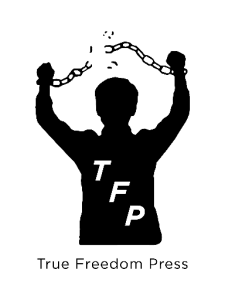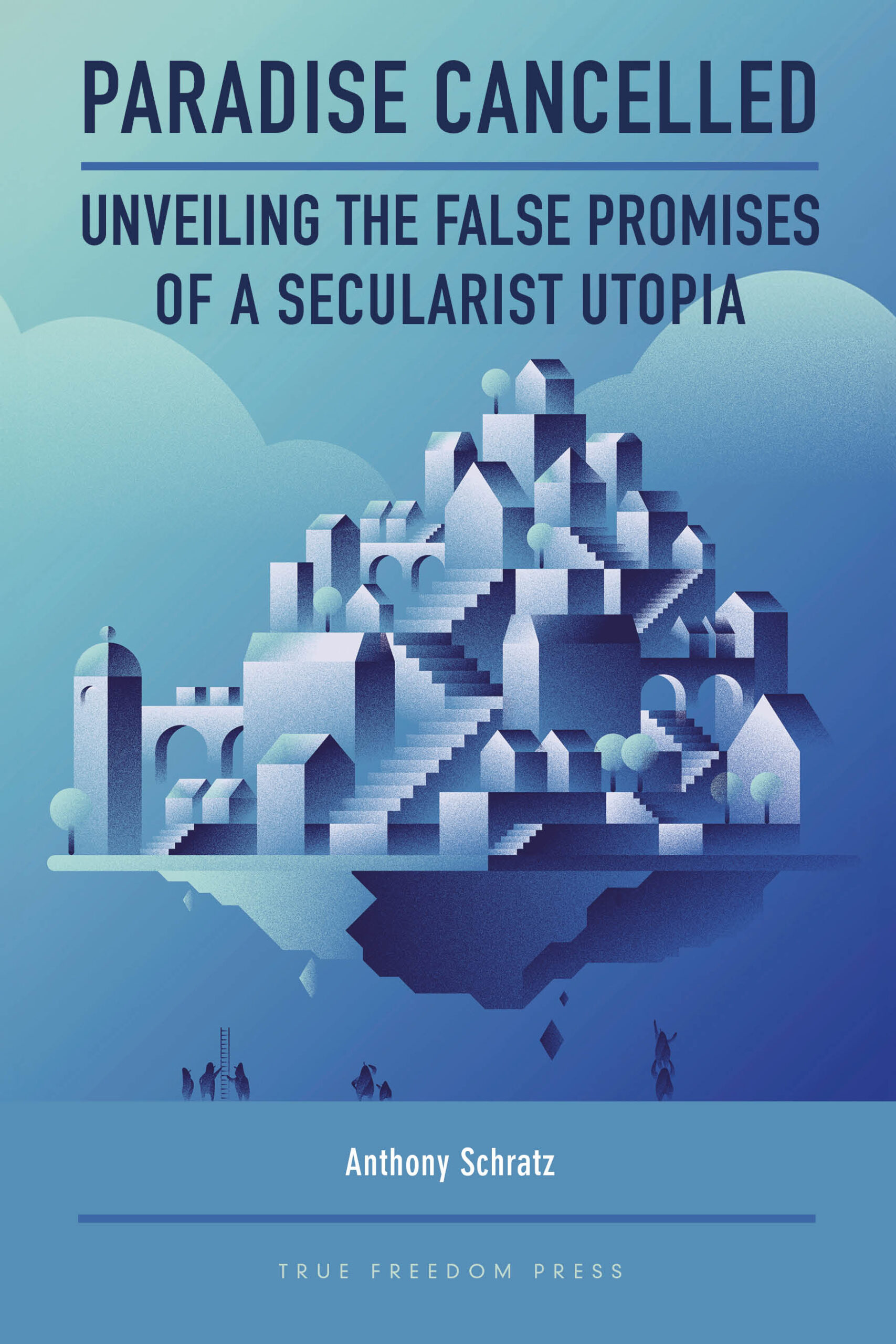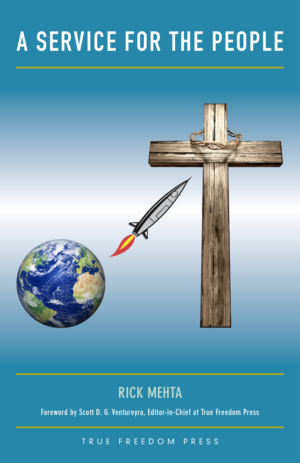Anthony Schratz
About the Author
Anthony Schratz is a retired lawyer and educator who has spent the past 40 years implementing leadership programs for youth. He has acquired expertise in Church History and has spoken at Apologetics conferences and other similar venues.
Since 2007 he has been the director of Ernescliff College, a university residence and formation centre for young men on the campus of the University of Toronto in which the activities of doctrinal and spiritual formation are entrusted to the Opus Dei Prelature.
About the Book
What does it mean to live a good life? And what is the make up of a society that can uphold and sustain it?
These are questions long pondered by some of the greatest philosophical thinkers. The modern worldview promises a society where freedom, justice, equality, and tolerance reign supreme. But does it actually live up to its billing? Have we been able to achieve a secular utopia? Or do we need to seek an alternative perspective — one that better fulfills the longings of the human heart?
Publisher : True Freedom Press (October 11, 2024)
Language : English
Paperback : 174 pages
ISBN-10 : 1998917134
ISBN-13 : 978-1998917136
Book Reviews
Richard Bastien, “Paradise Cancelled explores divide between Christianity and postmodernism,” Catholic World Report (December 7, 2024).
Paradise Cancelled: Unveiling the False Promises of a Secularist Utopia, by Anthony Schratz, Ottawa, Ontario, Canada: True Freedom Press, 2024, 151.
Paradise Cancelled explores divide between Christianity and postmodernism
We live in a world gone mad. This madness was foreseen a century ago by the Irish poet William Yeats in The Second Coming: “Things fall apart, the center cannot hold / Mere anarchy is loosed upon the world”. We need to understand what happened.
In Paradise Cancelled, Anthony Schratz does precisely that by first analyzing the intellectual and spiritual foundations of the Christian worldview and those of the postmodernist worldview (which he calls “Expressive Individualism”), and then explaining why it is impossible for those two worldviews to coexist peacefully.
The Christian worldview described by Schratz is in all respects consistent with the Magisterium. It proclaims that the universe was created by a transcendent Being infinitely good and powerful, a God who is also a Trinity of persons rooted in a communion of love from which issued the universe and man. It also proclaims that God created man in His image and likeness, calling him to heavenly bliss with Him after a virtuous life on earth.
Man has a material and mortal body, which makes him a part of nature like other animals. But, unlike the latter, he has been created “in the image of God”, which means that he is endowed with an intellect enabling him to grasp universals and immaterial realities, and a free will that allows him to choose freely between good and evil, i.e., to obey or disobey his Creator.
Having chosen to disobey the Creator, Adam and Eve brought sin into the world. This is what is called Original Sin. The Christian worldview is incomprehensible without this doctrine of Original Sin. Although we still have remarkable faculties, we are inclined to use them for evil. Deep down, we know there is something wrong with us. We are born without divine life in the soul because the human life we inherited from our first parents is “disconnected” from God. The result, as Alexander Solzhenitsyn famously put it, is that “the line separating good and evil passes not through states, nor between classes, nor between political parties, but right through every human heart”.
Since man is unable to remedy this evil with infinite consequences, only a divine intervention could reconcile him with his Creator. Thus, God promised a Savior who would restore him to his original friendship. God appropriated a people who, strengthened by the Law and prophets, were to prepare mankind to receive that Savior. After revealing Himself to men through the prophets, God revealed Himself to them by taking on their human nature, which gave rise to a new Covenant between God and man. This Covenant is represented by the Church, which continues the work of redemption by proclaiming that only Christ can lead us to eternal happiness.
All this implies that the Church has a very specific understanding of human nature. It teaches that our primary end is the imitation of and incorporation into Jesus Christ, that is, human virtue and divine holiness. Christ in effect redefined the meaning of life by showing that it is ordained not to wealth or pleasure but rather to self-giving and sacrifice. Because the human heart cannot be easily reconciled to such teaching, the Church is often misunderstood, feared or persecuted.
The Church teaches that the natural law (or moral law) is inscribed on the heart of man. It tells us what we must do and avoid to achieve our end, which is holiness. The natural law can be compared to a user manual, that is, the set of instructions and information a human being must have to live according to his nature. A thing is not good or bad because of what the natural law says about it. It only tells us what is right and wrong in the light of the great givens of human life. It is constitutive of our nature and accords with our end. Therefore, natural law is absolute, objective, and universal. It does not depend on our feelings or intentions.
In short, the Christian worldview is an anthropology centered on Christ. Anthropology asks: what is the meaning of life? The answer is not an idea, but a person—Jesus Christ! God made flesh!
The competing worldview is what Schratz refers to as “Expressive Individualism”, otherwise known as “wokeism”, critical theory or, more generally, postmodernism. It asserts that the universe is governed by man, not God. Its motto is that of Protagoras, for whom man is the measure of all things. It contradicts that of Plato, for whom God is the measure of all things; hence the impossibility for the two worldviews to coexist peacefully.
The distinguishing feature of this competing worldview is its emphasis on personal autonomy.
More specifically, it does not admit of any higher authority, religious or otherwise, to whom we are accountable. It denies the existence of any sacred order or, indeed, of any permanent truth. We are therefore required to choose our own values and lifestyles. Human nature is not a given we inherit, but a kind of modeling compound–a sophisticated kind of Play-Doh—that each one can manipulate as he pleases.
The most complete expression of personal autonomy is the LGBTQ+ ideology that belies the biological foundations of the male-female couple and the family. It aims to replace them with a purely subjective conception of sexuality and gender designed to abolish the traditional family.
The most eloquent expression of this gnostic-like sense of personal autonomy was perhaps expressed in the 1992 U.S. Supreme Court Planned Parenthood v. Casey decision, which defined this autonomy as follows: “At the heart of liberty is the right to define one’s own concept of existence, of meaning, of the universe, and of the mystery of human life”. In short, there is no transcendent meaning to life.
One of the great merits of Cancelled Paradise is the clarity with which it shows the inner contradictions of Expressive Individualism. It highlights the intolerance of those who hold that worldview towards those who do not. Like all past ideologues, whether Marxist, Fascist or Maoist, they consider all their opponents as pathologically irrational, homophobic, transphobic, sexist or racist. All these so-called “deplorables” ought not to be tolerated because they threaten the advent of the secular paradise that self-appointed enlightened Expressive Individualists (also known as progressive liberals) seek to establish. And if these deplorables ever invoke their right to free speech, they are told that there is no such thing as a right to “hate speech” and that to oppose Expressive Individualism is to engage in hate speech.
Another important merit of Paradise Cancelled is that it addresses directly what Christians should do in the present predicament. It asserts that there is no political solution to our existential crisis and that the solution is essentially spiritual. That is what Jacques Maritain wrote in Integral Humanism, when he called for a “New Christendom”, one to be founded on “a new style of sanctity, which one can characterize above all as the sanctity and sanctification of secular life”. That is what the Second Vatican Council reminded us of when it proclaimed that all Catholics—lay people as well as clerics—are called to be saints in the middle of the world. That is what Popes John Paul II and Benedict XVI asked for when they proposed a new evangelization. And that is the answer to Yeats’s claim in The Second Coming that the Christian era is terminated.
In short, the Christian worldview can defeat its secularist counterpart only if you and I become saints. In today’s parlance, that means becoming “weird”, as one well-known public figure recently found out. That happens to be also how Christians living in the Roman Empire were viewed. They were witnesses to Christ in a pagan world that in many ways resembled our own.
Paradise Cancelled: Unveiling the False Promises of a Secularist Utopia
by Anthony Schratz,
True Freedom Press, 2024
Paperback, 151 pages
In Anthony Schratz’s own words, published in The B.C. Catholic (December 31, 2024).
There is a worldview that is permeating our society, and for some time our Canadian society has been on its cutting edge.
It’s a movement without an official name, but it’s often referred to as Expressive Individualism, Secular Liberalism, or Wokeness. It promises a paradise characterized by freedom, equality, tolerance, and human rights.
It’s presented in a very attractive and seductive way, as being open-minded and respectful of different views and opinions. Since it allows for a diversity of lifestyles it is seen as a source of richness for a society and for the individual. This diversity increases the range of available options without forcing any of them on anyone, and so it is presented as a practical way to live in a pluralistic society and to ensure peace, fairness, justice, equality, and human rights.
It allows each one to exercise autonomy with respect to issues like divorce, abortion, same-sex relationships, contraception, euthanasia, transgenderism, promiscuity, consumption of drugs, etc. And it seems to be a mature and critical-minded position, allowing each person to think for himself: “I will decide what is right and wrong for me.”
At the same time, this worldview tends to blame the Catholic Church for much of what it deems wrong with Western Civilization. It portrays religion as basically superstition, and Christians as intolerant, dogmatic, narrow-minded, and judgmental people who want to impose their morality on others. The Church itself is seen as arrogant, since it contends that only it has the truth.
This worldview maintains that all the great achievements of our civilization were only made possible once it freed itself from the control of an obscurantist Church.
What is the best way for a Catholic to meet the challenge of this worldview?
As a celibate member of the Opus Dei Prelature for many years, I have been director of university centres that prepare young men for the challenges awaiting them in life by helping them become virtuous leaders who will make their Catholic faith the guiding principle behind their daily actions. It is our hope that these young men will play an important role in the re-evangelization of our society called for by recent Popes. This has always been a rewarding experience that has filled me with great joy.
Like everyone else, these young men have to face this prevailing worldview. They tend to admire Jordan Peterson and others whose podcasts and videos provide them with a freshness of vision and more self-confidence to challenge the ideals of Expressive Individualism. Yet when they first come into contact with our formation, they lack the intellectual formation required to craft a rigorous critique of this ideology. In working sessions with our new students, we have an easy time exposing the flaws and contradictions inherent in Expressive Individualism and demonstrating that its assault on Christianity is entirely without intellectual merit.
Over the years, I have become increasingly concerned about the vast majority of Catholics who do not have the opportunity to benefit from the formation that we offer. I fear that many of them will either be lured into believing the false claims of Expressive Individualism, or will find themselves unable to craft and articulate a serious critique of this ideology.
It is with that in mind that I set out to write a short book that would provide the reader with a simple, clear, substantial, and easy-to-read explanation of both the Christian worldview and Expressive Individualism, and the contradictions inherent in the latter.
Since I did not want to set up a strawman that would be easy to knock down, I wrote my description of Expressive Individualism in the most convincing way I could, so that someone who espouses that ideology would read it and agree that I had explained it in a completely satisfactory way.
Having done that, I went on in subsequent chapters to expose the fallacies, inconsistencies and errors of that worldview.
Most Catholics will know that the paradise promised by Expressive Individualism is illusory and cannot lead to true happiness. Ultimately, only Christ can fulfill the deepest aspirations of the human heart.





